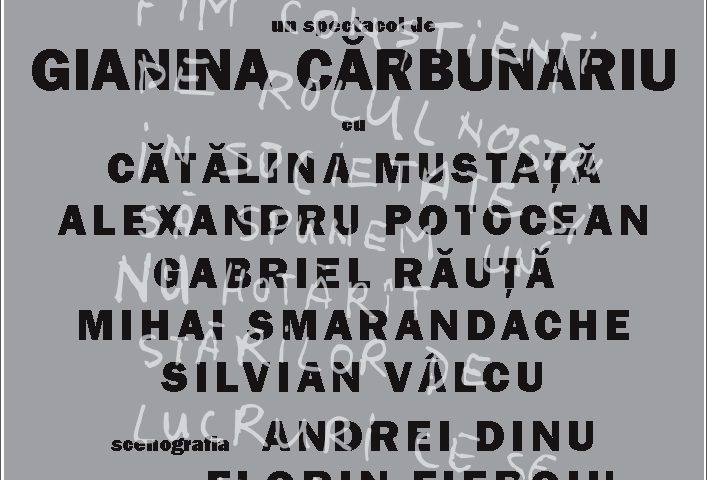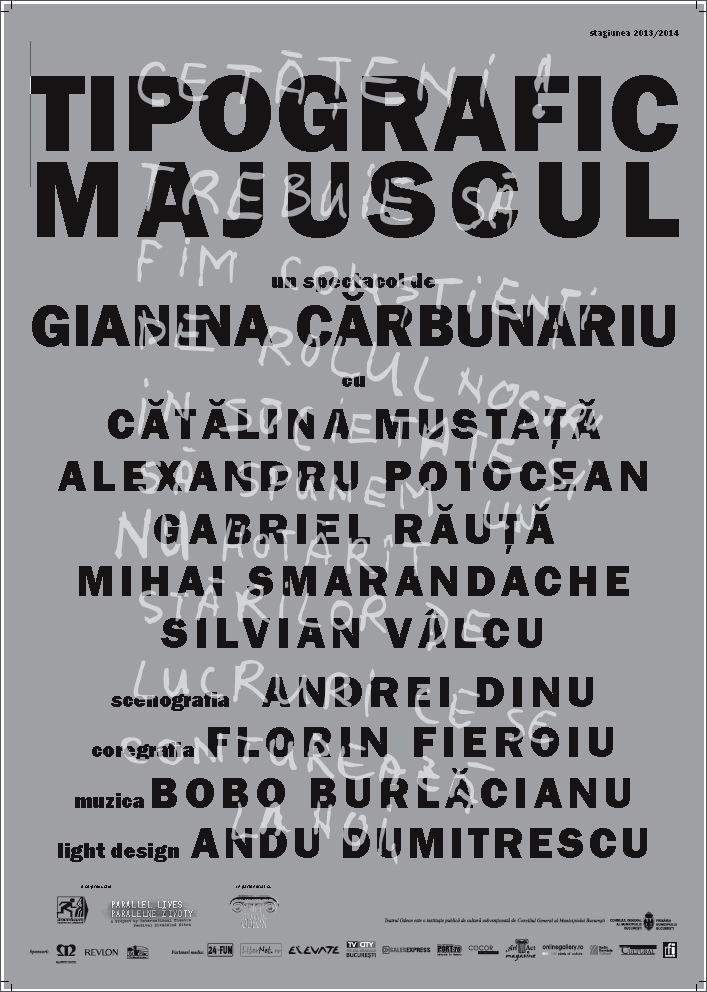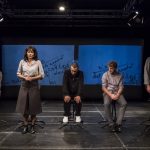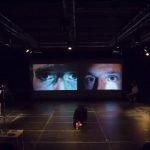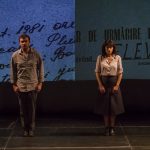A performance by Gianina Cărbunariu
Cătălina Mustaţă
Alexandru Potocean
Gabriel Răuță
Mihai Smarandache
Silvian Vâlcu
Stage design: Andrei Dinu
choreographer: Florin Fieroiu
Music: Bobo Burlăcianu
Light design: Andu Dumitrescu
Young Theatre Festival, Sibiu, November 5, 2019
Theatre Festival Piatra Neamt, September, 27, 2019
Memory Scenes Theatre Festival, Brasov, May 7, 2019
Young Theatre Festival, Iaşi, October 10th 2017
The „Parallel Lives” International Theatre Festival, Krakow (Poland), April 16, 2015
The „Parallel Lives” International Theatre Festival, Budapest (Hungary), November 18, 2014
The National Theatre Festival, Bucharest, October 28 and 29, 2014
The „Konfrontacje” International Theatre Festival, Lublin (Polland), October 18, 2014
The „Parallel Lives” International Theatre Festival, Prague (Czech), October 6, 2014
The Short Theatre Festival, Oradea, September 27, 2014
The „Parallel Lives” International Theatre Festival, Dresda (Germany), June 20, 2014
The International Theatre Festival, Sibiu, June 7, 2014
The ATELIER International Theatre Festival, Sfântu Gheorghe, June 3, 2014
The International New Theatre Festival, Arad, May 16, 2014
The Romanian Dramaturgy Festival, Timişoara, May 15, 2014
The Pro-thesis – Parallel Lives Minifestival, Slovakia, April 9, 2014
The ONE WORLD ROMANIA International Documentary Film Festival dedicated to the Human Rights, March 19, 2014
The „Transitions: 1.Balkans” International Theatre Festival, Athens, Greece, March 15, 2014
Temps d’images Festival, Cluj, 13 November 2013
International Theatre Festival Divadelna Nitra, Slovakia, 28 September 2013
Best Show Award at the Theatre Festival for Teens – Excelsior Teen Fest, 2015
Bucharest Art Week, October 16, 2015
draMA Contemporary Theatre Festival at Odorheiu Secuiesc, October 6, 2015
Excelsior Teen Fest, Bucharest, September 29, 2015
GIANINA CĂRBUNARIU – Award for the best stage director at the Short Theatre Festival, Oradea, 2014
Award for the best performance at The ATELIER International Theatre Festival, Sfântu Gheorghe, 2014
Award for the best stage director at The ATELIER International Theatre Festival, Sfântu Gheorghe, 2014
Awarded the Arcuş’s Cultural Center Award at The ATELIER International Theatre Festival, Sfântu Gheorghe, 2014
ALEXANDRU POTOCEAN, MIHAI SMARANDACHE, GABRIEL RAUTA – Award for the best actor in leading role at ATELIER The International Theatre Festival, Sfântu Gheorghe, 2014
Special Prize for document – theatre to Gianina Carbunariu for the show Typographic Capital Letters, awarded by Uniter Senate, 2014
Photo By Octavian Tibăr
Press Reviews
The great advantage of this show is its artistic objectivity. We are not witnesses to a sad story, we do not only mourn the martyr condemned without appeal and we do not pity ourselves for what we were meant to live. The historical fact is the starting point for an artistic act. Once a playwright, the content of the file “The Student” is a material as bidder as a well written play, if fallen into the right hands. The subjective-emotional load with all its baggage of residual feelings that are stored in those who were contemporaries of Mugur Călinescu is transformed into artistic pretense. It is indeed life squared, it is indeed the mirror of that world, it is really theater. And theater beats life in this case.
Alina Epingeac – Yorick.ro , September 23, 2013
Rarely, very rarely we meet such performances that are life “lessons” inspired by historical concreteness, loaded with emotion, tension and truth, produced with theatrical means that are not from the classical convention. Gianina Carbunariu and her team propose a “different kind of theater”, challenging for thinking and judging of the not so distant past of our history, and that is reported subtly to the present. ( … ) The unique show of Gianina Cărbunariu and her team, under the formula of a “different kind of theater” is an event sustained undisputedly by Odeon Theatre. Go and see “Typographic Capital Letters” because you will not regret it!
Ileana Lucaciu – Blogspot , September 22, 2013
A document-show, “Typographic Capital Letters” should be a kind of wake-up call for a society that is still not able to take upon itself the mistakes of the past, moreover, it leaves the former oppressors and perpetrators continue to live in a sheltered existence.
Silvia Dumitrache – Observatorul Cultural , September 26-October 2
Query of such serious and vital theme by using artistic means seems to be the most effective way of confronting with untold unresolved truths or, even worse, with the mystification of historical truth. Gianina Carbunariu and her exquisite actors invite us to this honesty exercise – a case of dozens, hundreds of thousands of cases, reconstructed dramatically and spectacularly before our eyes, another way to probe awareness and to invite to a debate.
Razvan Nita – port.ro , October 4, 2013
The team’s work is firstly one required for sorting things out and for understanding of a past largely responsible for our post-communist present. Young Alexandru Potocean, Gabriel Răuță, Mihai Smarandache and Silvian Vâlcu create a dynamic group that easily adjusts theirs means to the demands of the show (change of role, working with video camera, technical maneuvers on the stage…). Catalina Mustață joins them from another more mature generation, in a unique pose, playing the role of the mother with conviction and attachment, a mother that is caught between the dilemma of maternal love versus social obligations.
As the voice of civil society, the performance advocates for regaining the right to take attitude.
Doina Papp – revista 22 , October 8, 2013
The whole show is in fact a strong one from an artistic and emotional point of view; it is impeccably designed and flawlessly played. Based on a scenario without a crack, the surprising collations of facts and documents, Typographic Capital Letters means a great, a terrific examination of conscience.
Mircea Morariu – adevarul.ro , October 30, 2013

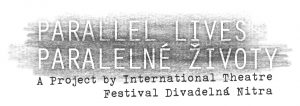
Mugur Călinescu (28 May 1965 – 13 February 1985) was just 17 and a pupil at A.T. Laurian High School in Botoşani when, in September 1981, he alerted the departments of the Securitate for a month because he wrote on panels and walls inscriptions intended to arouse in people a reaction to the way the rights and freedoms of citizens were being flagrantly disregarded, and to the disastrous state of the Romanian economy in that period. After Mugur was caught, he was continuously asked to come to the Securitate. Two years after the September 1981 episode, Mugur Călinescu fell ill with leukaemia. He died in 1985.
„Alongside documents written in the wooden language of the oppressive apparatus of the period (plans for measures, informative notes, analytic notes, etc.), the 200 pages of dossier no. 738 concerning “the Pupil” also preserve the declarations of a young man who succeeded in remaining faithful to his own convictions in spite of the pressures of the Securitate and the lack of solidarity shown by those around him. I believe that young people need models that they can understand, and Mugur Călinescu is, from this point of view, a necessary model of attitude.
I first came across the case of Mugur Călinescu when I read “The King’s Clothes” by the respected historian and essayist Marius Oprea, in his book “Six Ways to Die”. A copy of the “Pupil” dossier, together with interviews conducted with Mugur’s mother and with two officers involved in the case were made available by the historian and activist Mihail Bumbeş, whom I take this opportunity to thank for his assistance.
As in the case of the play “X mm out of Y km”, presented two years ago at the Paintbrush Factory in Cluj and based on a minute in the dossier of the journalist and dissident Dorin Tudoran, the approach adopted was an interrogation of the document by theatrical means. The script on which “Typographic Capital Letters” is based is a collage of ready-made materials (documents and interviews), but the play is an exercise of imagination, a fiction that attempts to question these traces of a reality in recent history and the way in which they help us to understand the world in which we live today.”
Gianina Cărbunariu

